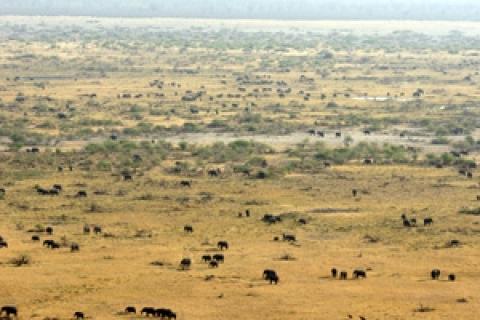
Most big game hunters dream of one day going on safari in Africa. Unfortunately, the opportunities to do so appear to be shrinking.
 |
| How much longer will huge herds of elephants like this continue to be a reality in Africa? Photo courtesy of Tony Pennington |
Safari Club International advised last week that the U.S. Fish and Wildlife Service is expected to soon announce a new policy to reject all elephant ivory imports from Zimbabwe and Tanzania, although it is unknown when this will occur. Unquestionably this is bad news for hunters and hunting, but also for elephants and African wildlife, in general, in those countries, as the millions of dollars that the safari industry brings in annually for governments and local villages alike are crucial for conservation, management and anti-poaching efforts. Conversely, when wildlife has no value, it is often slaughtered indiscriminately, and certainly both Tanzania and Zimbabwe already have significant poaching issues.
This news follows on the heels of the Botswana government's decision last year to end the commercial hunting of wildlife in public areas. Botswana was widely recognized as the premier elephant hunting destination, and a mature bull elephant is considered by many hunters to be the crowning achievement in a hunting lifetime.
Zambia, another of the Dark Continent's most revered destinations, recently closed its doors to lion and leopard hunting, and a number of its prime general hunting concessions are currently in a state of limbo in terms of allowing hunting.
Perhaps the biggest threat, however, is from poaching. Certainly this problem is nothing new, but whereas it was previously mostly small-scale by locals using ancient weapons and crude snares, organized Asian poaching rings and even terrorist organizations are now funding and equipping these illegal operations on a massive scale, with the slaughter of thousands of elephants and rhinos every year being used to meet the black market demand for ivory and to finance terrorist activities.
What can hunters do? For starters, we can join organizations such as Safari Club International that fight to protect our freedom to hunt and to promote wildlife conservation worldwide.
Perhaps the biggest thing we can do, however, is to stop putting it off and finally go on that dream African safari. Not only is there no way to know how long these opportunities will be open to us, but going on such a hunt now will contribute valuable dollars to local economies, and show local and international governments that hunting is the first line of defence against poaching throughout Africa.
The first step is to contact a reputable booking agent such as The Hunting Consortium or Jack Atcheson and Sons and let them make all of the arrangements. For more tips, see An African Safari is Affordable and Make Your Dream Hunt a Reality.
Good hunting.
- 2549 views

